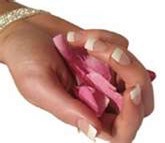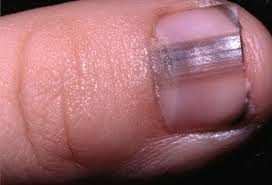Nails… how to protect and condition
David T. Harvey, MD Mohs Surgeon & Cosmetic Dermatologist
 Nails are an important part of our anatomy. They can be windows to our internal health as their appearance can be altered by medical conditions such as anemia, kidney disease and psoriasis. Nails are subject to the environment, e.g. such as cold, humidity and trauma. The following will outline some important nail hygiene tips and manicure recommendations .
Nails are an important part of our anatomy. They can be windows to our internal health as their appearance can be altered by medical conditions such as anemia, kidney disease and psoriasis. Nails are subject to the environment, e.g. such as cold, humidity and trauma. The following will outline some important nail hygiene tips and manicure recommendations .
NAIL HYGEINE TIPS
- Keep nails clean and dry, to prevent bacteria accumulation or other infectious organisms from collecting under the nail bed.
- Give your nails periodic rest from any cosmetic related treatments, for one to three months per year.
- Eat plenty of protein and use biotin supplements. This can help with brittle nail syndrome. Usually, we recommend that 2.5 mg be taken daily for at least 6 months. This was based on a dermatology study in 2007. Biotin is found in high concentrations in meat, fish, milk, soy (tofu) and eggs.
- Moisturize the nails on a daily basis. You can give nails an intense moisturizer therapy by soaking them in warm olive or castor oil or utilizing urea based creams for 5 to 10 minutes a day.
- Protect the nails from harsh detergents and solvents.
- Cut your fingernails and toenails straight across, and round them slightly at the tip. This will help to preserve nail strength, and minimize the risk for ingrown nail development.
- Use a fine textured file to keep the nails shaped and free of snags.
- Avoid biting or picking at the nail or the nail skin in order to prevent infection.
- Develop good nail habits early.

Nail unit melanoma
- If you have an unusual or persistent wart, or any spot on your nail that does not heal, such as a pigmented band that localizes itself on the nail bed and spreads onto the cuticle, please have this evaluated as even skin cancer can occur in this area.
- Use acetate to remove nail polish instead of acetone or formaldehyde as these latter two agents can dry out your nails.
MANICURES
If you frequent beauty salons, take the necessary precautions. Inspect the salon beforehand to make sure that it is up speed. A certificate from the Board of Health must be prominently displayed on the walls of your manicure salon stating that it has met all the proper guidelines. If you don’t see a certificate, ask the manager where it is located. If the manicure salon hasn’t been inspected by the Board of Health, it will be in your best interest to choose a different salon. You should, bring your own instruments to your appointment if you are not sure that your salon is sterilizing appropriately. Although many beauty shops will tell you that they soak their nail instruments in disinfectants, this does not ensure that all wart viruses and bacteria will be destroyed.
As with all things…it is important to be aware and observant.


